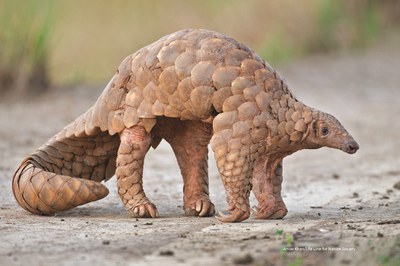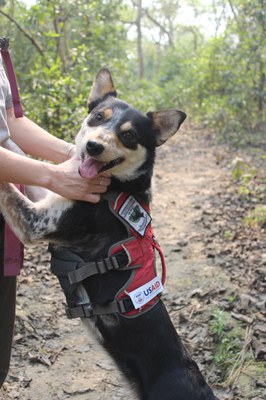DNA Detective Dogs Saving Pangolins

Athena is part of a specialized team at Conservation Canines (CK9), a University of Washington (UW) based non-profit that rescues shelter dogs and puts their noses to work for wildlife conservation. While Athena may think her time in the field is just another day of play, she is actually creating a DNA reference map for the pangolin species.
Founded by Sgt. Barbara Davenport, master canine trainer with the Washington State Department of Corrections, and Dr. Sam Wasser, director of the Center for Conservation Biology at UW, CK9 trains dogs to locate scat from threatened and endangered species, including the pangolin. Graduate student H.J. Kim has been working with Athena and her handler to track pangolin scat in Nepal and Vietnam.

But it’s not as simple as it may sound. Kim notes that the team has faced a few challenges in the field, including flat tires, food poisoning, road closures, and sneaky pangolins. The team discovered that pangolins bury their scat, making it difficult to locate. “The dogs have been amazing!” she notes, “Without them, we would have had a very difficult time finding scat.”
Back in the lab, the team extracts DNA from pangolin dung and adds to their map of pangolin genetics. When a large seizure of pangolins is discovered, they will be able to cross-reference the DNA from the seizure with the DNA reference map to identify poaching hotspots. By knowing these areas, enforcement agencies can more-efficiently target anti-poaching efforts to save endangered species when time is of the essence.
Kim and Wasser's team are one of four grand prize winners of the USAID-funded Wildlife Crime Tech Challenge, a competition that rewards innovative science and technology solutions that tackle specific aspects of wildlife trafficking – including detecting transit routes, collecting and using forensic evidence, and reducing consumer demand and corruption. The Tech Challenge is one way we are bringing new ideas to the fight against the illegal trafficking of terrestrial and marine wildlife.


